Jude Knight's Blog, page 78
September 4, 2019
Pets and other animals on WIP Wednesday

Today, I’m looking for excerpts with animals. I’ve started my contemporary again — or, at least, I am writing a new beginning about a week before the one I already had. I’m starting with my hero being tripped up by a cat right at the moment he meets the heroine and decides he wants to impress her. So I decided to focus on excerpts with animals today. Meet the cat on my cover, who plays a crucial role in the plot as the bringer of chaos. Meet him briefly, that is. He doesn’t stick around.
“Yes. I am Meg Fotheringham.” The deity behind the counter extended her hand for Patrick to shake. Patrick stepped forward, his eyes locked on hers, determinedly not allowing them to slip to the glories outlined by her apron. Don’t stuff it up, Patrick. Smile. Say something normal. And then he was falling, crashing into the baskets and cake stands clustered on the counter.
Patrick, winded by the sharp blow to the chest, was barely conscious of a large tabby cat that shot out from under his feet and through a cat door at the back of the room.
“Are you all right?” Ms Fotheringham asked, as she hurried around the counter to help him back to his feet. “That dratted cat!”
Patrick was trying to draw in enough air to breathe, while surveying the chaos his fall had made — crushed chocolate cake, scattered buns and cupcakes, broken gingerbread cookies.
“I’m sorry,” he managed.
Ms Fotheringham frowned at the mess. “Not your fault,” she assured him. She was still holding his arm and now she nudged him towards the nearest chair. “Please sit down. I’ll make you a cup of tea or coffee. You were looking for me? No, never mind. Get your breath back first.”
Tea sounded wonderful. The long bus ride, the shock of his new landlady’s youth and loveliness, the fall — combined, they’d left Patrick limp as a dishrag, no better than he’d been when the glandular fever had been raging full force through his system.







September 1, 2019
Tea with Rand Wheatley
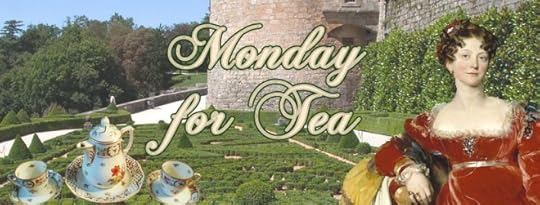
Randolph Baldwin Wheatly—plain mister though he boasted an earl and a duke among his nearest family—prowled, ill at ease, in the anteroom of the Winshire Mansion waiting for the duchess’s favor. She was, he had been told, engaged in some sort of charity project, one of her innumerable works, but she would see him.
The more he paced the more foolish his errand seemed. He had been here on more vital errands before, and yes, he had been summoned for a chastising from Her Grace more than once in his life. His purpose today might puzzle or confuse the lady, although if you had asked him a year ago he would have said he doubted anything could do that.
“Mr. Wheatly, Her Grace will see you now,” the young lady who had greeted him announced.
Rand cleared his throat and tugged on his formal waistcoat. Even properly dressed with his hair trimmed by the earl’s valet he suspected he still looked more mountain man than proper English gentlemen, the result of too many years in a reclusive cabin in Upper Canada. What can’t be fixed must be endured. The duchess will have to take me as I am.
“Rand, this is a surprise.” A few graceful movements on the duchess’s part and he found a delicate porcelain cup in his hand, the aroma of tea tickling his nose. After a few months in England he’d become used to the stuff again.
“How can I help you?” Her Grace asked. “I thought your efforts in Bristol went well. Are congratulations in order?”
“No she’s— You mean the investigation? Yes. The entire operation has been shut down and the Duke of Sudbury is seeing to the conspirators.”
“But your personal endeavors…” the duchess peered at him sympathetically.
“Meggy is at Songbird Cottage, if that is what you wish to know. Charles is nearby watching over her while I keep my distance. I can’t guess the outcome.”
“Sadly, we often can’t. The future always includes surprises.”
“Actually,” he said, “The future is what I came about. You will think me fanciful, but my sister Catherine thought you might help.”
“What exactly does the Countess of Chadbourn think I can tell you about the future? I am not an oracle.” She seemed amused.
“Since returning from Bristol, I’ve had nightmares. Armies moving over a hellish landscape scraped clean of vegetation, trees with no branches or leaves on them, andmen lying in holes in the ground. The guns and the cannon are like nothing I’ve ever seen before, as if factories will begin to mechanize war beyond our understanding. I fear I’ve seen a Great War in our future.”
“Nightmares indeed!”
“Do you believe it is real?”
“If it is, don’t fear it is the entire future. Remember the past contains its share of death and destruction as well, and yet mankind lumbers on. Love, faith, and family see us through.
“That’s the other thing,” Rand said. “There’s one man in particular. I heard someone call him Canadian. He has courage, determination, and strength yet he battles despair in the midst of it all. There’s a woman who gives him hope to go on I think.”
A beatific smile came over the old woman’s face. “Love, faith, family,” she repeated.
“The thing is, he looks like me,” Rand said. “He’s a Wheatly. Could he be my son or grandson?”
“Or a great-great if your dreams are true, but yes, I think so,” she mused. “Do you see what that means?”
He had no idea what she tried to tell him. His face wrinkled in the attempt to puzzle it out.
She signed deeply. “Don’t be dense, Rand, you’re a bright boy. It means you will return to Canada, and you will have a family there.”
He shook his head. “I wouldn’t want one of mine to endure that horror.”
“We can’t protect the ones we love, Rand. Besides, you didn’t see the end. You have to believe he comes through it. You have to have hope.”
Rand Wheatly’s story, including the doings in Bristol and the outcome of his love for Meggy is told in The Renegade Wife.

As to that great-great grandson, Harry Wheatly will face the Great War in 1914. Christmas Hope tells his story.

About Christmas Hope
After two years at the mercy of the Canadian Expeditionary force and the German war machine, Harry ran out of metaphors for death, synonyms for brown, and images of darkness. When he encounters color among the floating islands of Amiens and life in the form a widow and her little son, hope ensnares him. Through three more long years of war and its aftermath, the hope she brings keeps Harry alive.
Rosemarie Legrand’s husband left her a tiny son, no money, and a savaged reputation when he died. She struggles to simply feed the boy and has little to offer a lonely soldier, but Harry’s devotion lifts her up. The war demands all her strength and resilience will the hope of peace and the promise of Harry’s love keep her going?
When the Great War is over, will their love be enough?
There are links and an excerpt here:
About the Author
Award winning author of historical romance usually set in the Regency and Victorian eras, Caroline Warfield reckons she is on at least her third act, happily working in an office surrounded by windows where she lets her characters lead her to adventures in England and the far-flung corners of the world. She nudges them to explore the riskiest territory of all, the human heart, because love is worth the risk.
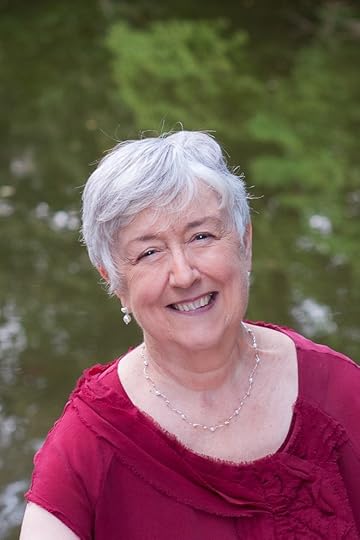
Carol Roddy – Author







August 31, 2019
Historical Modern, Historical Traditional, and Historical that happens to be Regency

A category all its own
As you know, I’ve thinking about how to categorise what I write. I’ve also been talking with a friend about the apparent great divide in what historical fiction readers, particularly Regency era readers, like to read.
We’ve noticed that some readers are passionate about stories where the heroes and heroines behave in ways they understand — like modern men and women — and even totally reject stories where heroes and heroines follow the dictates of the time. Other readers are the opposite. They will be very hard on an author whose heroes and heroines don’t behave as they think a Regency-era person would have.
I read and enjoy both kinds. All I ask is a good writer and a convincing story, and I know I’m not the only one. But in the interests of those who are disappointed by the wrong book, perhaps we need some new genre segments so that readers can find what they want.
Here’s my attempt at some definitions.
Historical modern
This describes a large group of popular Regencies and many Medievals. The focus is on the romantic relationship. Any subplots are completely subsidiary to the romantic plot. The heroine thinks, talks, and often acts like a modern woman. She is sometimes castigated or shunned for this, but she has support from either family or a close knit group of friends. The hero respects and supports the heroine’s right to be an independent thinker and to act according to her principles, even if this brings her straight up against those who hold a more traditional line. The landscape abounds in dukes and other peers, and even seamstresses of dubious origins can expect to marry one.
I love these. At their best, they are perfect escapist reading. Every heroine is beautiful in the eyes of every charming hero, and they are all charming. Cinderella will go to the ball. Marriages of convenience prove to be love matches, and rescued chimney sweeps (every heroine is charity personified and an environmentalist as well) go on to join the household of happy servants whose lives revolve around our lovely couple. The best authors provide reasons why this particular man has missed the misogyny and arrogance of his class, and why this particular woman is better educated and less restricted by her social conditioning than hers.
If you haven’t read Tessa Dare, Eloisa James, Sophie Jordan, Sally MacKenzie, Katherine Ashe, Lisa Kleypas, Courtney Milan or any of their peers, now’s good! Suspend your disbelief and settle in for a gay romp.
Historical traditional
Do you like your story to focus mostly on the romance, but for your characters to be truer to the historical setting? This segment of the historical romance genre gives us heroes and heroines who act within the constraints of their Society, but who nonetheless give us a charming story and a happy ending. Expect a focus on Society and on events such as morning calls, balls, house parties, and other entertainments.
Again, I love them. Expect a lovely light touch, delightful heroines, and a variety of heroes not all of whom carry high titles. In these books, our heroines might defy Society, but they pay the price. Or, they hide their real selves in order to fit in.
Try Candice Hern, Mary Balogh, some of Carla Kelly, Jo Beverley, Edith Layton, Carola Dunn, Anne Gracie. These were where I started. I read every traditional historical I could find, and only later moved outside of that genre..
Historical that happens to be Regency
I think this is what I write. In one of these, the historical events, whether fictional or non-fictional, are true to their times and have a strong presence in the book, often even shaping the plot. In such books, the romance plot line is still important, but might not be the only important plot line. The characters act according to their times, though of course some people in every time have been forward (or backward) thinking, and personal circumstances can shape a person to stand against social expectations.
They tend to be grittier and more confronting than the other two types, and you come out of them thinking again about attitudes and events you thought you understood. If you haven’t read Caroline Warfield, you’re missing a treat, though her Victorian series is stronger in this than her Regency series. That said, most of the other authors I can think of are writing Victorian, too. Meredith Duran, anyone? We could apply the same segmentation to other eras, I guess.
Historical modern can overlap into Historical that happens to be Regency. One of my all-time favourites is Grace Burrows’ Captive Hearts series. Out of era, but Elizabeth Hoyt’s Maiden Lane series and Jessica Cale’s Southwark series are both in this part of the spectrum. I’d put much of Mary Jo Putney in here, too.
Historical traditional can also overlap. Carla Kelly does this wonderfully well.
Which one has the steam?
The simple answer is: all of them. I’ve read authors in each of my segments who write at the ‘sweet’ end of the scale, and authors whose characters set flame to the pages. The same applies to cursing, expletives, and rude words for anything to do with copulation. Violence? You’ll find that across all segments, too.
I’d love to do a diagram, but I’ve run out of time.
Your turn to comment
What do you think of these categories? Do you agree with where I’ve put certain writers? Can you think of others? Do you read them all? Which do you prefer?







August 25, 2019
Spotlight on The Herald’s Heart
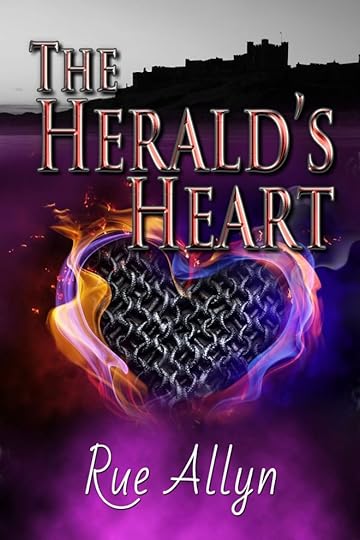
My review of The Herald’s Heart: A gem for lovers of the medieval
In The Herald’s Heart, Rue Allen has given us a medieval novel that is out of the ordinary, with an unusual plot, strongly drawn characters, and gothic overtones, including a mad anchoress and a haunting.
Three people are out for revenge — or is it justice? — for the crimes of one man, and him an untouchable feudal lord. Their plots conflict: the hero and heroine, in particular, can’t both achieve their goals. A win for one is a loss for the other.
The hero is a King’s herald, sent on a mission to call the lord to account. He has his own reasons for relishing the king’s work. The heroine is a great lady and heiress brought low and reduced to scraping a living amongst people who regard her as mad.
I found the hero’s insistence on continuing to call the heroine a liar long after her main claim was proven to be annoying, but his eventual capitulation and grovelling were satisfying.
More would give away plot points you really ought to read for yourself, but I can’t resist telling you that the murder weapon might just be the most unusual one I’ve ever heard of, and depended on intimate knowledge of the victim and his own co-operation.
Rue tells us about her book
Jude, thank you so much for the opportunity to share The Herald’s Heart with your followers. Please allow me to explain a little bit about the inspiration for The Herald’s Heart. At the time I was drafting this story, identity theft was a major news story (yes, the book is that old). I knew that proving one’s identity in the middle ages was difficult, if not nearly impossible. It was the job of the royal heralds to visit every noble household, verify identies, record any changes, and if it was important, accept copies of the records about the local yeoman population. A herald was essentially a census taker, and the information was used for the same purposes as a present day census: to assign taxes, to draft soldiers and sailors, and maintain identies.
Imagine, if you will, having to rely on the hand written record of a man, who may no longer be alive, to verify that Sir So-and-so of Somewhere in England actually was the person he claims to be. What happened when two claimants to a title appeared whom no one had ever seen before? No wonder medieval kings and queens required that their nobles show up at the royal court on a regular basis.
When the royal summons was ignored, as it was in The Herald’s Heart, the king (or queen) would dispatch a herald to record the truth of things and perhaps carry a message to the delinquent noble that his royal master was not pleased. Appearance at court alone would prevent any dire consequences.
You’ll note that I just said the herald might carry a message. That was in some respects their major job, especially in time of war. But The Herald’s Heart is inspired by the census taking aspect of a herald’s work. I had a wonderful time writing this story and pray you will enjoy it when you read The Herald’s Heart. Please leave a comment letting me know if the story interests you or not.
The Herald’s Heart is available for pre-order now through this Universal Buy Link: https://books2read.com/u/bowW2A. The book is set for general release on September 2, 2019. If you would like to know more about The Herald’s Heart, you may find an excerpt here https://www.rueallyn.com/hh-excerpts-...
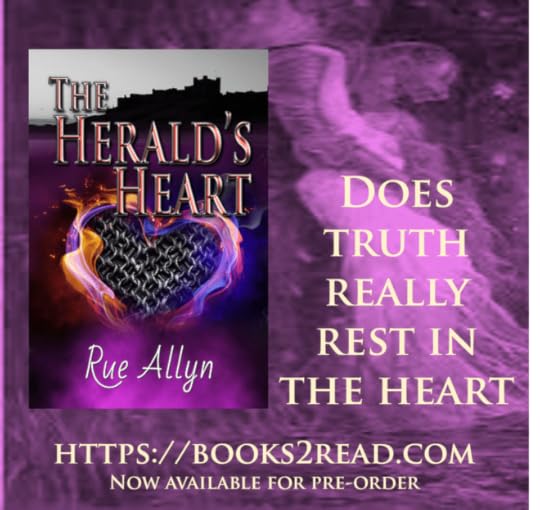
Blurb:
As one of King Edward I’s heralds, Sir Talon Du Quereste imagined he would someday settle on a quiet little estate, marry a gently bred damsel, and raise a flock of children. The wife of his daydreams was a woman who could enhance his standing with his peers, and certainly not an overly adventurous, impulsive, argumentative woman of dubious background.
When her family is murdered, Lady Larkin Rosham lost more than everyone she loved—she lost her name, her identity and her voice. She’s finally recovered her ability to speak, but no one believes her claim to be Lady Larkin. She is determined to regain her name and her heritage, but Sir Talon Du Quereste guards the way to the proof she needs. She must discover how to get past him without risking her heart.
Meet Rue Allyn
Award winning author, Rue Allyn, learned story telling at her grandfather’s knee. (Well it was really more like on his knee—I was two.) She’s been weaving her own tales ever since. She has worked as an instructor, mother, sailor, clerk, sales associate, and painter, along with a variety of other types of employment. She has lived and traveled in places all over the globe from Keflavik Iceland (I did not care much for the long nights of winter.) and Fairbanks Alaska to Panama City, Panama and the streets of London England to a large number of places in between. Now that her two sons have left the nest, Rue and her husband of more than four decades (Try living with the same person for more than forty years—that’s a true adventure.) have retired and moved south.
When not writing, enjoying the nearby beach or working jigsaw puzzles and singing along with her playlist, Rue travels the world and surfs the internet in search of background material and inspiration for her next heart melting romance. She loves to hear from readers, and you may contact her at Rue@RueAllyn.com. She can’t wait to hear from you.
What Rue likes best about the belles is their can-do spirit. “This group isn’t afraid to try anything the publishing world can dish out. The only other place I’ve found such completely supportive energy is with my fellow sisters-in-arms, both active duty and not.”
Social Media Links:
FB– https://www.facebook.com/RueAllynAuthor/
Twitter– https://twitter.com/RueAllyn
RAmblin’ Author Notes, blog— https://www.rueallyn.com/blog/
Amazon– https://www.amazon.com/Rue-Allyn/e/B00AUBF3NI
Email– Rue@RueAllyn.com
Goodreads– https://www.amazon.com/Rue-Allyn/e/B00AUBF3NI
Pinterest– https://www.pinterest.com/RueAllyn/
Author pic: See attached.







August 23, 2019
Interview with Sabrina Jeffries
August 19, 2019
Tea with a tohunga

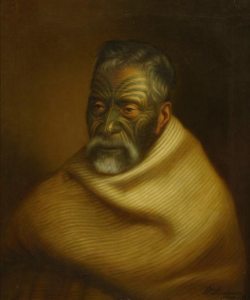
Tuhoto Ariki, Tohunga who predicted disaster before the Tarawera eruption
The old man waiting in Eleanor’s parlour was unlike anyone she had seen. Old? The man was ancient. He had ignored the chairs scattered around the room, and sat on the hearth rug before the fire, but he looked around as she entered the room.
“Tuhoto Ariki?” she asked, unsure of how to pronounce the unfamiliar name that had appeared in her appointment diary.
He gave a smile of considerable sweetness, distorted though it was by the tattoos that covered his face. His return greeting was in a fluid and musical language that she did not know, but whatever alchemy presented people from other times and places in her parlour also translated their words, so that her ears heard a foreign tongue, but her brain understood the meaning.
“Greetings,” he said. “I am he, and this is a strange dream. Am I in the land of Queen Victoria? Perhaps you are she?”
Eleanor took a seat on the chair closest to the old man. “Our queen is Queen Charlotte, the wife of King George. I am the Duchess of Haverford. May I ask where you come from, and what year?”
She could make nothing of his answer. He spoke of a canoe, a mountain, a river. He talked about the generations since that ancestral canoe first arrived, but none of the names he mentioned translated into anything Eleanor could understand. In return, she told him a little of the United Kingdom in her time, but that got them no further.
They were interrupted by the procession of maids, bringing the makings for tea and plates of refreshment. Tuhoto Ariki accepted tea, asking for sugar but refusing the milk.
“I am trapped in my house by the ash from the taniwha’s fire,” he explained. “My throat is parched, back in my life. I like your pretty room better, though it is cold, Duchess of Haverford.”
“Trapped in your house?” Eleanor queried.
“I warned them, the foolish young men. You are greedy, I told them, and the gods are angry. You take too many visitors to the sacred places. ‘The visitors make us rich,’ they said. ‘The carvings in Hinemihi, our meeting house, have gold coins for eyes.'” He shook his head. “They did not listen. Even when the phantom canoe came, they did not listen.”
Eleanor leaned forward. “Tell me about the phantom canoe.”
“They appeared out of nowhere. A canoe the like of which has not been seen on the lake in half of my lifetime. They were dressed for a funeral, chiefly spirits who paddled a short distance and faded away like mist. ‘We shall be overwhelmed’, I warned the villages, but no one listened to me. Then the taniwha under the mountain awoke and the sky split apart with its fire. Who knows how many will survive? Te Wairoa, the village of the meeting house with the golden eyes, is buried and me with it.” He took another great gulp of his tea, and then faded away like the phantom canoe, leaving nothing behind but a cup and saucer tumbling from the air to land on the hearth rug.

Tuhoto Ariki is an historical figure. The events of which he speaks, culminating in the eruption of Mount Tarawera, form the background for my story Forged in Fire, in the Belles’ collection Never Too Late and my own collection of New Zealand based stories, Hearts in the Land of Ferns, Love Tales from New Zealand.
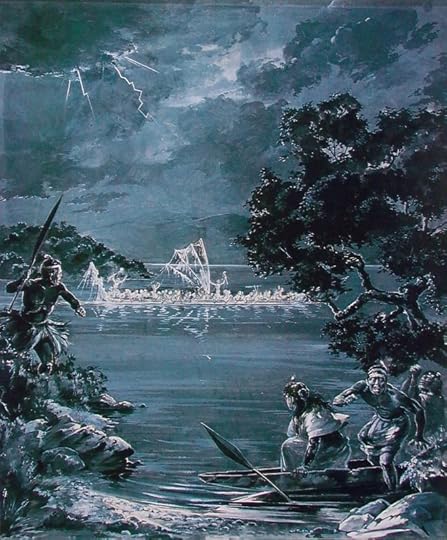







August 16, 2019
Regency Slang
August 13, 2019
Tension on WIP Wednesday

Tension is an important part of a story. If we’re not on the edge of our seat wondering how it’s all going to turn out, we might as well be painting our nails or watching the grass grow.
This week, I’m inviting you to share a passage where you ratchet up the tension. It might be dramatic tension, romantic tension, suspenseful tension, comedic tension–your choice. Mine is from To Wed a Proper Lady, and is set in the aftermath of a duel between my hero’s brother and his loathsome cousin.
“Good shooting, brother,” James said, clapping Drew on the shoulder.
“Idiot would have been fine if he hadn’t moved,” Drew grumbled. Weasel had shot before the final count and missed. When Drew had taken his turn, he had announced his intention of removing Weasel’s watch fob from the chain that drooped across his waist, and ordered the man to stand still.
At the other end of the field, Weasel was carrying on as if death were imminent. His second, the Marquis of Aldridge, after a brief examination, gave the Winderfield men a thumbs up before leaving Weasel to the ministrations of the doctor. Aldridge was now giving orders to the servants by the carriage that had brought him and Weasel to the duelling grounds.
“Breakfast?” James suggested.
“Good idea,” Drew said. “Let’s collect Yousef and…”
As if his name had conjured him up, their father’s lieutenant appeared from the trees and stalked towards them. Something about his posture brought James to full alert, and Drew sensed it too, stiffening beside him.
“Trouble?” James asked, as soon as Yousef was close enough.
“An assassin in the woods, armed with a pistol like these.” He gestured to the gun that Drew had replaced in its case until he had time to clean it. “You were not meant to walk from this field, Andraos Bey.”







August 12, 2019
Tea with a love letter

The Duchess of Haverford took tea in her rooms this quiet Monday afternoon. She was alone for once; even the maid who brought the tray sent off back to the servants’ hall. Her life was such a bustle, and for the most part, that was how she liked it, but just for once, it was nice to have an afternoon to herself. No meetings. No entertainments to attend or offer. Not even any family members–her current companion had gone to visit her mother for her afternoon off, Aldridge was about his own business, Frances was at lessons, and Jessica and Matilda had been invited on an outing with Felicity Belvoir.
As to Haverford, who knew where he was? But he would not disturb her here. He had not come to her rooms since Jonathan had brought Frances to join her nursery–the little girl a greater gift than her son could ever know. The scandal of the child’s existence was a secret Haverford needed to keep from his royal cousins, and she had been able to use her knowledge of that secret to secure her wards’ future under Haverford’s reluctant and anonymous protection, and her own freedom from his intimate attentions.
It had been an unpleasant negotiation, determined on her part and rancorous on his–not that he much wanted his aging wife, but he resented having his will forced. In return for his agreement, she had promised to continue as his political hostess, and to maintain the myth of a perfect Society marriage.
Why was she spoiling a perfectly good afternoon thinking about His Grace? She came up here to explore quite different memories.
Putting down her tea, she fetched the little box of keepsakes from the back of a cupboard. The fan her long dead brother had given her before her first ball. A small bundle of musical scores, that recalled pleasant evenings in her all too brief Season. Aldridge’s cloth rabbit. She had retrieved it when Haverford had ordered it destroyed, saying his son was a future duke and should not be coddled. Aldridge had been eight months’ old. A pair of Jonathan’s bootees. She had knitted them with her own hands, and there had been a cap to match. A rose, faded and dry, that she had pulled from a bouquet James had sent her, to wear in her hair. It still bore a faint scent of the perfume he had delighted in as they danced that night.
And the letter. It was one of several she had kept; most of them brief notes about nothing in particular. ‘I saw these and thought of you’, on a card with a bouquet of sweet spring flowers. ‘Save me a dance at the Mitford’s tonight?’ ‘I saw you in the Park. You rode like a goddess.’ They did not have to be signed. They were all from James, and short because they had to be passed to her in secret. “I’m not throwing you away on a third son, Eleanor Creydon. Winderfield is a fribble; a useless pup. Haverford wants you, and I’ve accepted him.”
James was back in England, a widower, father of six sons, heir to a dying duke. “Take that, Father,” Eleanor thought. “The third son will be duke, and his sons after him.”
He had attended the ball she was at the night before last. Eleanor had looked up when the room fell silent, and there he stood on the stairs, surrounded by members of his family, whom she barely noticed. James looked wonderful. More than thirty years had passed, and no person on earth would call him a fribble or useless now. He had been a king somewhere in Central Asia, and wore his authority like an invisible garment. And he was still as handsome as he had been in his twenties.
She caught herself signing over the man like a silly gosling. She was a married woman, and he was a virtuous man who had, by all accounts, deeply loved his wife. Besides, women did not age as well as men, as the whole world knew. She no longer had the slender waist of a maiden, her hair was beginning to grey, and her face showed the lines her mother swore she would avoid if she never smiled, laughed, frowned, or showed any other emotion. Of course, she had not followed her mother’s instruction, but those who had were no less lined than Eleanor, as far as she could see.
Gads! She was prevaricating. She had come here to reread James’s last letter; the one that had broken her heart; the one she had ignored, leaving her to a lifetime of regret.
Stealing herself, she opened it.
My dearest, dearest love
My father is in it, too. He says that Haverford is to have you, as soon as he has recovered from his wounds.
I wish I had never challenged the duke, or that I had shot to kill. I meant only to defend your honour; to show he could not speak of you as if you were his possession. Even a husband should hesitate to show such disrepect to the woman he has promised to cherish above all others, and so I told him. ‘You are not even her betrothed,’ I told him, ‘and the last man on earth to deserve her’. I am very sorry, Eleanor. I lost my temper, when I should have been thinking of the best way to press my case with your father.
Now, the devil is in it, my father insists that I must flee the country. He says Haverford will have me arrested for shooting him, and Father won’t lift a finger to stop him.
Come with me, Eleanor. I promise I can look after you. The ship my father has organised leaves in two days, but I have a friend who can get me away tomorrow night. I promise I can look after you. I’ve sold the little estate my mother left me, so I have funds. We will go to the Continent. I can find work, I know I can, and we will be together. I know it won’t be what you are used to or what you deserve, but I love you, and you love me. Is that not worth fleeing for?
Meet me by the oak near the back gate of your garden as soon as the house is quiet tomorrow evening. I will be there from 8 of the evening and will wait until 2 hours after midnight. We have to be on the ship in time to sail with the dawn, and by the time your household wakes, we shall be gone down the river, and out to sea.
Come with me, my love.
Yours forever
James







August 11, 2019
The art of reading reviews

Okay. I confess. I’ve been reading reviews of my books again. People are always advising authors not to do it, but I always do. My books tend to get good ratings, but not everyone loves them. I’m good with that. I write the books I like to read, which means a large cast of characters, lots of everyday life, convoluted plots, serious and dark complications, nasty villains, and nice heroes and heroines.
A good review is a great morale boost, especially on the days that the plot elves go on strike, the weather is lousy, I’ve eaten something that disagreed with me, I haven’t had enough sleep, I’ve taken a dislike to both my current protagonists, and I have a deadline looming and too much to do between now and then.
Good reviews are not just ones that say the book is marvelous; that’s nice, of course, but what I love to read is why the reader thought so. Even a low rating can be rewarding to read, if I come away thinking, ‘yes, I see where they’re coming from’. I can either learn from it or agree to disagree, but at least I know!
Mostly, reviews of any kind are one person’s opinion, and they’re entitled to it. We don’t all enjoy the same things. I’m okay with that. In fact, a review only upsets me for two reasons.
Reason one, I’ve done something stupid and now that it is pointed out to me it’s really obvious, even though no one in the whole development process–from my first readers, through the beta readers and editor, to the proofreader and ARC readers–has noticed. That has happened a couple of times, and I hate it. The mistake in the title of one of my key repeating customers. Aaaargh! I’ve had to come up with a complicated backstory to fix it.
Reason two, the reader castigates me for getting the research wrong when I didn’t. I hate that. I do try hard to get things right, and it rubs me the wrong way when a lofty reviewer informs other readers informed that my book is unbelievable because ‘a woman back then wouldn’t have [insert the independent action of your choice]’/’the writer should have done some basic research into [almost anything that the reviewer has a prejudice about–one review was a lecture on church tithing based on modern, but not Regency, practices]’.
But what can you do? The facts are the facts, but I can’t change people who base their facts on opinion.
I’m writing a couple of reviews at the moment. I don’t, usually, mostly because I don’t have time. I’m never tempted to spend that time writing a review of a book that I rate as three star or less, because I’m not about to spoil another writer’s day, and it is, after all, only my opinion.
I do, occasionally, write four and five star reviews. And when I do, I post them on my website as well as in the usual places. I like to do it, because reviews matter to authors, and I feel I should do my bit. When I can.
What do you think? Should authors review other authors’ books?










